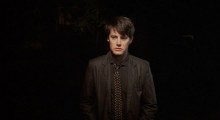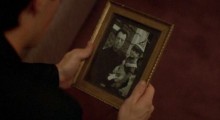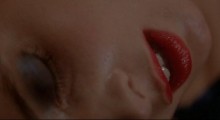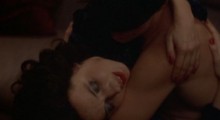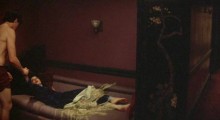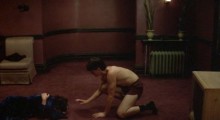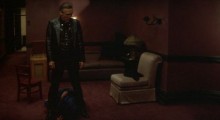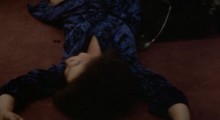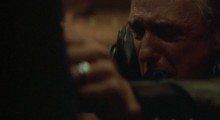The Blue Velvet Project
-
The Blue Velvet Project, #67

Second #3149, 52:29 1. After leaving Dorothy’s apartment, Jeffrey walks home in the dark, in one of Blue Velvet’s furiously abstracted montage sequences, where sound and image come together to convey a doomsday atmosphere so totalizing and intent on destruction (the destruction of innocence) that to try to convey it in anything less than one long sentence would be a betrayal, not only of the fact of black in this frame, but of the blackness of Jeffrey’s heart and his realization of this blackness in his face, in that askance look, as if he was the one ravaged instead of […]
by Nicholas Rombes on Jan 16, 2012 -
The Blue Velvet Project, #66

Second #3102, 51:42 The frame within the frame. Jeffrey, on his way out of Dorothy’s apartment, stops and retrieves from beneath the couch the framed black and white photo of Don and Donny that Dorothy had gazed at immediately after Frank’s call. A fury of angles and lines, rectangles within rectangles. The frozen image captures a moment in time, while what transpires on the screen (no matter how many years have passed since Blue Velvet was filmed) happens right now. Seymour Chatman, in Story and Discourse, writes about still time and moving time on the screen: The effect of pure […]
by Nicholas Rombes on Jan 13, 2012 -
The Blue Velvet Project, #65

Second #3055, 50:55 “I’m leaving now,” says Jeffrey. Dorothy, her back to the camera, stands in the bathroom, facing the mirror, her red shoes on the tiled floor beside her. Another radiator, like an iron spy from another world. The screen, divided against itself. Crowded by darkness, Dorothy’s space is a like a music track awaiting the vocals. The open toilet some sort of joke. A zombie film: Dorothy dead and not knowing she is dead, hungry for Jeffrey’s flesh, or the way hallways always lead to bad ends. In a room across the city, her son held hostage. The […]
by Nicholas Rombes on Jan 11, 2012 -
The Blue Velvet Project, #64

Second #3008, 50:08 Dorothy’s face fills the screen, leaving no room for thought. At this moment, there is no possibility of anything outside the frame. This may seem an odd moment, an odd frame, to re-introduce the power of ideology, for there seems to be nothing overtly “political” about this frame. And yet, Dorothy’s suffering here—rendered in a fashion-photography aesthetic—is utterly reactionary and in tune with a certain mid-1980s, Ronald Reagan wave of nostalgia. In their toxic, neural pathway altering chapter from Dialectic of Enlightenment (1944) entitled “The Culture Industry: Enlightenment as Mass Deception” (an essay which remains the ultimate […]
by Nicholas Rombes on Jan 9, 2012 -
The Blue Velvet Project, #63

Second #2961, 49:21 “Do you like me?” Dorothy asks. “Yes,” says Jeffrey. “Do you like the way I feel?” These are simple, almost childlike questions and answers, tender, quiet exchanges of whispered words as if to replace the previous horrors with a new hope. In John Banville’s 1997 novel The Untouchable, Victor Maskell narrates the story of his transformation into and life as a double agent for the Soviet Union during the 1930s, 40s, and 50s in England: We were latter-day Gnostics, keepers of a secret knowledge, for whom the world of appearances was only a gross manifestation of an […]
by Nicholas Rombes on Jan 6, 2012 -
The Blue Velvet Project, #62

Second #2914, 48:34 1. In the aftermath of the assault, Dorothy calls Jeffrey Don, her kidnapped husband’s name. Jeffrey tenderly corrects her. “No,” he says. She doesn’t seem to hear him: “Oh Don. Hold me.” Frank, Jeffrey, and Don, the three men circulating in Dorothy’s imagination. Don. Donny. “Little” Donny. The largely off-camera presence of the Donnys governs the logic of the film. 2. In David Mamet’s 1994 play The Cryptogram, Donny (“a woman in her late thirties”) has this exchange with Del (“a man of the same age”), in which she tells him that sometimes she wishes she was […]
by Nicholas Rombes on Jan 4, 2012 -
The Blue Velvet Project, #61

Second #2867, 47:47 For the first time since Frank’s prolonged assault on Dorothy, the camera has shifted perspective, freeing us from Jeffrey’s gaze. A new space opens up, one that has not been revealed entirely before, with the kitchen in the implied space behind the camera, and the dark, cave-like shadow of the apartment door area occupying the frame’s center. Jeffrey—still in his black socks, humanized—crawls toward Dorothy who will, when he caresses her head, jolt as if bitten by a snake. The implication is that she is still enmeshed in Frank’s world, even though he is no longer physically […]
by Nicholas Rombes on Jan 2, 2012 -
The Blue Velvet Project, #60

Second #2820, 47:00 Throughout this entire sequence, we never once see Dorothy from Frank’s point of view. In fact, the camera stays positioned entirely on Jeffrey’s side of the room, adopting, if not his precise point of view from within the closet, then at least his general angle of vision throughout. Even when we see Dorothy’s face close up, it is not from Frank’s point of view; we are never permitted to cross the invisible line that divides the room to see things from Frank’s side. On one level, this increases our identification with Jeffrey; for the most part, […]
by Nicholas Rombes on Dec 30, 2011 -
The Blue Velvet Project, #59

Second #2773, 46:13 There is a tendency, with the passage of time, to soften the edges. If Blue Velvet is remembered as notorious, it is notorious in a faintly wholesome, Frank Capra, nostalgic way. The danger of nostalgia is that it drains away the extremes, and leaves you with a comfortable—but inauthentic—middle ground. Blue Velvet earns its tender glow only because that glow has had its origins in the black evil furnace of Frank. The frame brings to mind Walton Ford’s painting Malmaison (2008), and the momentary gap it suggests between victim and prey. That gap, that space . . […]
by Nicholas Rombes on Dec 28, 2011 -
The Blue Velvet Project, #58

Second #2726, 45:26 1. The danger of the close-up, bringing the viewer ever nearer to the rage of Frank’s face. It’s almost clinical: a portrait of a madman and of an actor playing a madman. Reaching out to part Dorothy’s robe, Frank’s hand occupies nearly as much screen space as his face. And almost half the screen is in darkness, as if leaking in from some extra dimension. 2. Sergei Eisenstein, in his 1944 essay “Dickens, Griffith, and the Film Today,” wrote: We know from whence the cinema appeared first as a world-wide phenomenon. We know the inseparable link between […]
by Nicholas Rombes on Dec 23, 2011
